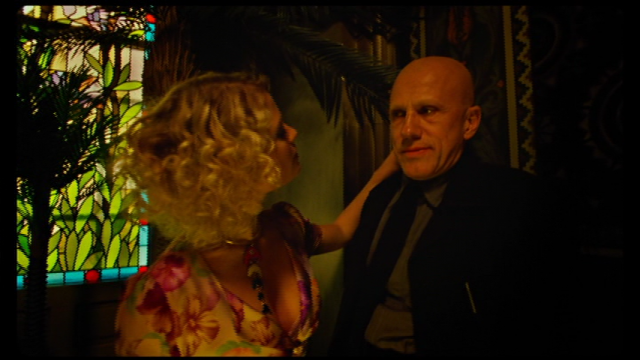If there was any defining theme to Terry Gilliam’s movies, it’s a protagonist searching for something to bring them solace. Starting with Time Bandits, where a young boy jaunts through time in order to escape the tyranny of his evil parents, Gilliam’s protagonists actively search for that one elusive spark to bring peace to their life. Even Raoul Duke and Dr. Gonzo in Fear and Loathing in Las Vegas are actively fighting against the system of capitalist oppression to find life’s missing pieces left behind in the aftermath of the Sixties.
The Zero Theorem exists in a similar vein, with one major change: passivity. Instead of actively seeking out or fighting for his missing pieces, Qohen Leth (Christoph Waltz) is passively waiting for meaning to come to him. Qohen, a bald-headed, middle-aged man living in an old monastery filled with Gilliam’s trademark old/new furniture, is waiting for his phone to ring with the call that tells him what is his life’s purpose. In an attempt to spark this meaning of life, he has eliminated as much pleasure and stimulation from his life as he can. But, because he lives in a pseudo-future-modern world, he has to go to work at a number crunching job draining his energy through mindless, droning, activity.
The first act where Gilliam is setting up the story and its inner tensions is exciting and vibrant. The story throws a barrage of sets and social situations at Qohen, forcing him to deal with everyday distractions. By the end of the first act, Leth convinces Management to allow him to work from home, where he can wait for his call. Management sees something in him, and puts him on the task of solving the Zero Theorem where the goal is to get zero to equal 100%. Qohen is then content to sit at home, idly doing work, waiting for his call as life passes him by.
Even at home, Qohen has to deal with life’s complications instead of fighting for what he wants. Among the distractions manufactured to keep him busy are a drop-in supervisor (David Thewlin) who hates him, a therapist (Tilda Swinton) who manipulates him for the company, a woman (Melanie Thierry) who wants to please him, the adolescent son (Lucas Hedges) of Management, and invasive marketing campaigns. Much as with Brazil was Sam Lowry’s film, The Zero Theorem is Qohen Leth’s film, and there is hardly a minute that we’re not dealing with Qohen’s passive trials and tribulations. Can Qohen keep these distractions at bay enough to do his job successfully and finally get his call?
The question of whether any movie is a “good” movie generally has two variants: is it successful, and did it entertain. By making The Zero Theorem about a passive protagonist, Gilliam has put those two questions almost at odds with each other. Qohen’s life drags on and on, endlessly waiting for that phone call, while the people actively living their life passes in and out of his life. This is also the point of The Zero Theorem, in that Gilliam is asking what is the purpose of life if you’re not actively living it or fighting for it. If you’re waiting for life to pass you by, is it living? And, how do these distractions help or hinder? It is successful in that The Zero Theorem stimulates thought towards a passive life of living to work. Yet, in order to ask these questions, The Zero Theorem must drone on and on repeating themes and motifs over and over and over again.
Adding to the repetition is The Zero Theorem seeming like Gilliam’s greatest hits. Brazil provides the corporate elements and set design, The Fisher King provides the mashup of ancient and modern mythology, Fear and Loathing is searching for purpose in an insanely distracting world, and Tideland provides a fantastical setting for escaping from stress and pressure. It almost feels like every Gilliam movie has suddenly collapsed in on themselves into this one movie about a passive middle-aged man waiting for life to begin.
If The Zero Theorem isn’t entertaining, it’s because that’s its purpose. Yet, it provides enough interest to keep you distracted until you realize you’re bored with it. The form serves the purpose, but both the form and the purpose are to irritate and provoke into thought. Is it successful? Yes. But, it is not a pleasant movie. But, when have Gilliam’s movies ever been pleasant?

